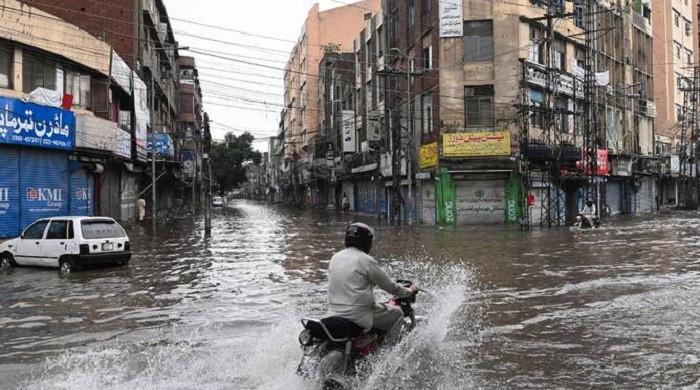Heavy Rains and Flash Flood Warnings Issued Across Pakistan
Starting Monday, Pakistan is bracing for widespread heavy rainfall as a robust monsoon system advances, prompting weather authorities to issue warnings for potential flash floods in vulnerable areas.
The Pakistan Meteorological Department (PMD) has indicated that a new weather pattern is poised to deliver rainfall across much of the northern and central parts of the country between August 4 and 7.
Azad Jammu and Kashmir, along with Gilgit-Baltistan, are expected to experience significant impacts from this incoming episode of intense rainfall, according to meteorological forecasts.
Meanwhile, parts of Khyber Pakhtunkhwa are preparing for strong winds and thunderstorms as this monsoon system makes its presence felt.
Punjab, previously hard-hit, and the capital, where rainfall has been persistent, are also expected to encounter substantial rainfall during this period.
Farther south, Sindh and Balochistan may see scattered rainfall starting around August 6, according to projections.
The Met Office is strongly advising vigilance due to the heightened risk of flash floods, which could lead to overflowing streams, overwhelmed drainage systems, and inundation in low-lying zones. Local administrations have been instructed to be ready.
While earlier rain patterns largely affected the country’s northern regions, leaving southern Pakistan relatively dry, weather officials anticipate a shift.
Around August 10, monsoon currents may start moving southward, potentially bringing increased rainfall to Sindh and nearby regions by mid-August.
The PMD further cautioned that if this trend continues, rainfall could extend into late September, surpassing the typical end of the monsoon season in the southern part of the country.
Meteorologists attribute these shifting weather patterns to climate change, suggesting that the monsoon season could last until the end of September this year, deviating from the usual mid-September conclusion.
Experts have pointed out that southern Pakistan has experienced less monsoon impact thus far, with rainfall significantly below previous years’ levels.
Given the anticipated rainfall in the coming days, disaster management agencies are urging residents, especially those in flood-prone or low-lying locations, to take necessary precautions.
Monsoon rains are a regular element of South Asia’s climate, playing a vital role in crop irrigation and water resource replenishment.
However, the adverse effects have been amplified in recent years by rapid urbanization, inadequate drainage infrastructure, and the increasing frequency of extreme weather events linked to climate change.
Provincial Disaster Management Authority (PDMA) Punjab has issued an alert for the sixth spell of monsoon rains. Heavy monsoon rains are predicted in most districts of Punjab from August 5.
Due to the rains, there is a possibility of medium to high-level flooding in the Chenab and Jhelum rivers from August 5. Monsoon rains in August are predicted to be more than last month.
PDMA Punjab has issued an alert to the commissioners and deputy commissioners across the province.
Rain is predicted in Murree, Galliyat, Attock, Chakwal, Jhelum, Mandi Bahauddin, Gujrat, Gujranwala, Hafizabad, Lahore, Sheikhupura, Sialkot, Narowal, Sahiwal, Jhang, Toba Tek Singh, Khushab, Sargodha, Mianwali, Nankana Sahib, Chiniot, Faisalabad, and Okara, Dera Ghazi Khan, Bhakkar, Bahawalpur, Khanewal, Pakpattan, Vehari, Lodhran, Muzaffargarh and Rajanpur.
According to PDMA officials, a low-level flood was already present at the Khanki point in the Chenab River, while similar conditions were reported in the Indus at Kalabagh, Chashma, and Taunsa.
Tarbela Dam was reported to be at 89%of its capacity, while Mangla Dam stood at 61%. Water flows in the Jhelum, Ravi, and Sutlej rivers remained normal, as did associated hill torrents.
Relief Commissioner Punjab Nabeel Javed has issued instructions to the commissioners and deputy commissioners, and the relevant administrations across the province, to remain alert.
PDMA Punjab has issued instructions to the civil defence, rescue and related institutions to complete arrangements.
PDMA Director General Irfan Ali Kathia said that in view of the instructions of the Chief Minister, Maryam Nawaz, an alert has been issued to the relevant departments.
Staff in emergency control rooms should be kept on alert. Disaster response teams of Rescue 1122 should also be kept on high alert.
The public should follow the precautionary measures issued. There is a risk of landslides in Murree and Galliyat due to heavy rains.
There is a risk of damage to mud houses and dilapidated buildings due to rain. Travellers and tourists should be cautious in view of the weather conditions and avoid unnecessary travel.
In case of urban and flash flooding, stay in safe places and never cross the flowing water. In case of emergency, contact PDMA’s helpline 1129.



Comments (0)
No comments yet. Be the first to comment!
Leave a Comment